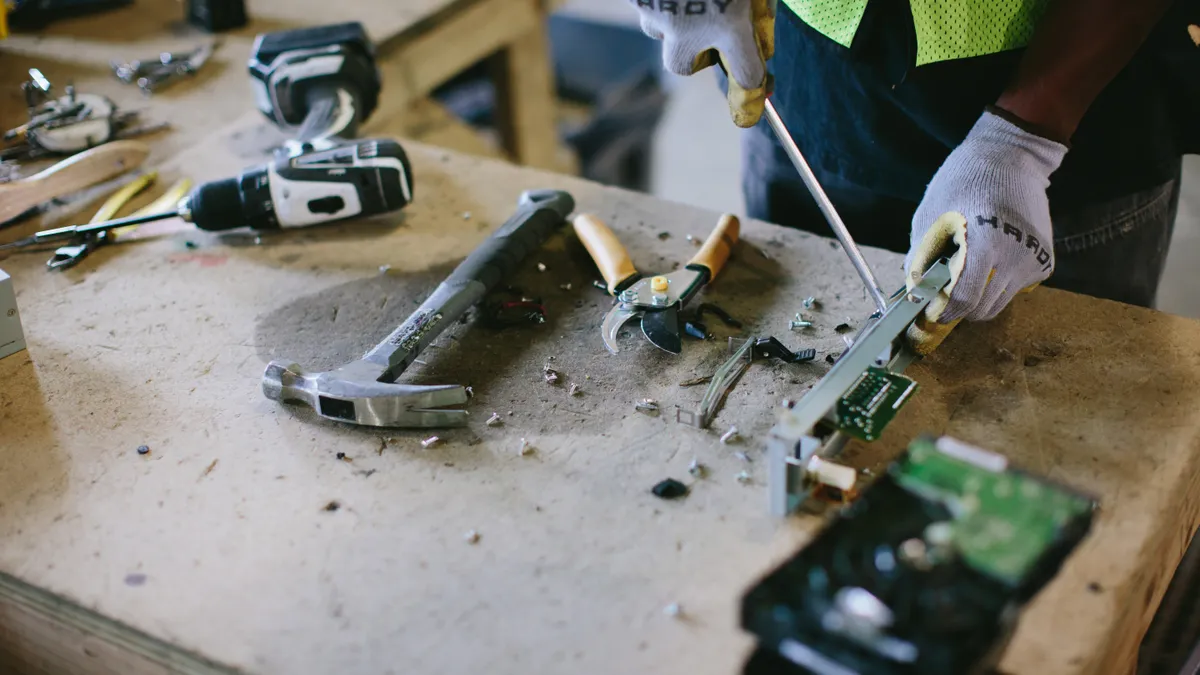It's a tumultuous and exciting time for Right to Repair advocates.
On the one hand, the movement has ostensibly gained essential traction over the past several months: Some Democratic presidential candidates have called for nationwide repair legislation, and bills have been introduced in at least 20 states around the country. Just last week, Apple even announced a new program to allow more independent retailers access to its parts and tools.
On the other hand, Apple still won't extend that policy to individual consumers – and the federal government recently announced plans to cease its purchase of refurbished and used IT equipment.
As national director of U.S. PIRG's Right to Repair campaign, Nathan Proctor has a front-row seat to all the victories and setbacks. And despite the best efforts of tech behemoths, he's confident in the movement's ability to prevail.
Waste Dive recently spoke to Proctor about the values of Right to Repair, the societal implications of planned obsolescence, and the environmental and market repercussions of e-waste.
The following conversation has been edited for brevity and annotated for context.
WASTE DIVE: What first drew you to the Right to Repair movement?
PROCTOR: We started exploring Right to Repair as part of our New Economy program at U.S. PIRG. We were concerned that, with our economy changing, people were losing agency over technology. To us, the ability to maintain products locally without the help of the manufacturer or paying the manufacturer's rates – that's part of having a resilient economy that works for people and that people have control over. So that's really where we came to this issue.
It seems that Apple and all these other tech giants are more or less playing a game of whack-a-mole with repair legislation – one bill springs up, and they shoot it down. How would you characterize the progress U.S. PIRG has made?
PROCTOR: It's very difficult to pass a law. But I've been involved in dozens of efforts across the years with U.S. PIRG where we've managed it, and I think that the real thing that I look to – what we've done in Right to Repair – is building a strong network of supporters that are increasingly engaged and capable of driving the conversation.
One recent example is working with this group called Securepairs.org. They're cybersecurity experts who had heard these security arguments manufacturers were making about why we shouldn't have the right to fix the equipment we own. They decided to come off the sidelines, and we've helped them create their organization and launch it. And now we have these tremendous experts who are coming to stand alongside us – and who really understand the technology and why Right to Repair is not a cybersecurity threat. So it's good to have those talking points, but it's even better to have those people.
iFixit CEO Kyle Wiens said the passage of Right to Repair legislation anywhere could break the proverbial dam, because manufacturers aren't going to provide products differently to people in one jurisdiction. Do you agree?
PROCTOR: I would agree. That's what happened with cars. Massachusetts voters approved the auto Right to Repair Initiative by a vote of 86% to 14%, which was a huge landslide win for auto Right to Repair. Pretty soon after that, the manufacturers came to the table and made an agreement with independent auto mechanics for a national Right to Repair for cars.
Right now, we haven't had manufacturers come to us and want to sit down and work this out. They're basically just saying, "No, no, no." But once we start forcing their hand, I think we could see a very similar thing happen. There are certain companies that may hold onto their repair monopolies until the last possible moment – we'll see how that works out. But I have confidence that as soon as we start breaking through, many of the companies will just come to the table and work something out with us.
What's your relationship with these companies?
PROCTOR: You know, we're competing against each other on these particular arguments. But a company like Microsoft, Apple or John Deere – they have so many people working there, and the objectives of their government relations team or lobbyists are not necessarily the same as those of everyone else in the company.
We have conversations with the people working for these big companies who are not their lobbyists, and they think about these issues. They may not dictate company policy on them, but any company is a big collection of individuals with their own perspectives and thoughts. They might have a company line, but there's also complexity there.
You begin to see that in the way they treat things publicly. Motorola, for example, is now the only cell phone company where you can get original equipment, batteries, screens and instructions for how to repair it yourself ... That's the case with HP, Dell and Lenovo computers, and it's what we're asking for with Right to Repair. Some of these companies are just starting to do it on their own.
What does your ideal Right to Repair legislation look like?
PROCTOR: Our model bill requires companies to give consumers and independent businesses access to what we think are the necessary components to complete a repair – namely, the schematics or technical diagram provided to a repair technician.
We need any kind of diagnostic software that can tell you what's wrong with the physical components on the device. They make that available to their own technicians. They should make it available for the owner of the device. Any spare parts they sell, they should sell to us, too.
Any special tools. For example, Samsung makes a special tool to open Galaxy phones. Your independent cell phone repair shop can't buy that from Samsung. They should sell it to whoever wants to buy it.
And the last thing would be the ability to reset the firmware or to apply firmware patches. Firmware is software that runs on physical components that basically allows for interoperability – it allows different parts of something to talk to one another.
You mentioned the cybersecurity arguments laid out by repair opponents – Apple, for instance, has cited safety concerns with phone batteries. Is there any credence to those objections? How do you typically respond?
PROCTOR: The battery argument is, to me, the weakest argument they make. They say these batteries are dangerous, so you should only use manufacturer-authorized batteries. But they won't sell us manufacturer-authorized batteries.
Proctor points out how this argument came up again during the recent FTC workshop.
If lithium ion battery safety is a real concern, they should immediately and urgently share technical information with people so we know how to safely handle the batteries in our products, because they sold the phone with a battery in it. They can't maintain some kind of auxiliary ownership of my phone because they think the battery inside is dangerous – they should provide me with the exact technical information on how to handle it.
Yes, there are safety risks with any piece of equipment – my chainsaw, my automobile and my ceiling fan – and we've managed those risks as owners of products. This is not a new thing – just because these devices are smaller and newer doesn't mean they're more dangerous. I mean, the lead acid battery in your car is much more dangerous than the battery in your cell phone. So the idea that you should be able to change the battery in your car, but not in your phone – that doesn't make any sense to me at all.
Proctor goes on to discuss product obsolescence trends, predicting they will only worsen as devices become more complex.
As we move into the Internet of Things, this is becoming a huge problem ... We're just at the beginning of this IoT market shift, and we really need to establish better rules for the owners of devices and for consumers. Otherwise we're going to create mountains of garbage. You make a computer that also makes coffee, some kind of software bug happens, and all of a sudden you're prematurely junking all these completely useful products just because you've decided only the manufacturer can have operation of those things.
Can you talk about the impact of repair restrictions on the market?
PROCTOR: We're at a critical point for the repair marketplace. The example we use, sometimes fearfully, is what happened with cameras. A number of years ago, probably in about every medium-sized town in America, there was at least one camera shop. There are probably just a few hundred left, because manufacturers decided at some point to stop working with repair shops. They stopped providing spare parts, service information, diagnostic software, etc. – the things we're asking for.
It's tough out there for a lot of people in the repair business. Apple, for example, has a T2 chip in their computers that basically knows when you make any repairs to the device. If Apple wanted to, this chip has the capability of basically shutting down the operation of the device until Apple-authorized service – instantly making it so that all these independent Apple repair technicians can't do those repairs anymore.
This is not an impossible-to-imagine near future – where a lot of these businesses are gone and you have no option but the manufacturer to get something fixed, and you have to pay whatever they decide to charge you. And a lot of times, they're probably just going to push you to upgrade. This is not technologically sustainable, and it's bad for the market.
What about the environmental impact?
PROCTOR: Electronic waste is the fastest growing part of our waste stream. Americans get rid of 416,000 cell phones every day. The waste systems we have now – not only can they not really manage that, but we shouldn't have systems that would manage buying a $1,000 cell phone and then throwing it out after 18 months. That's an absurd relationship with technology that's completely unsustainable from a resource standpoint. We should find ways to reduce the amount of e-waste we generate. The easiest way to do that is to keep the stuff that we've already made working properly. And to do that, manufacturers need to come and work with us.
A large majority of the toxic metals, heavy metals that are entering landfills and other parts of the waste stream is from electronics. Even though it's a small part of the waste stream by volume, in order to make a computer, you have to use a bunch of heavy metals. You have toxic flame retardants, you have a bunch of stuff that poses severe health risks – from respiratory disease to developmental problems to cancer.
If you both make a product that has all these chemicals in it and then treat it as artificially disposable so you can force more sales, that's going to pose a big problem to wherever that waste ends up.
So do you think Right to Repair in itself is enough to significantly slow the production of e-waste, or do we need accompanying measures?
PROCTOR: This goes into my core reason for being a Right to Repair advocate. It's really about consumers' relationship with manufacturers and manufactured products. We have a broken relationship with our stuff. We don't know how it works. We slough off all the power and agency over these products back to the manufacturer – and, as a result, we do an absurd thing to our technologies. We're buying $1,000 hand-held supercomputers, and we're throwing them away because the batteries are going bad. A $30 part, which takes a qualified technician 15 minutes to fix. There's an expectation from consumers that they can't fix it, and we need to change that.
So as much as we're taking on the barriers to repair that exist in the marketplace, we also have to take on what we've come to expect and allow as Americans – as human beings in the world – when it comes to our electronics. The public conversation around the values of Right to Repair is just as important as addressing the actual barriers.
I talked to filmmaker Amy C. Elliott a few months ago about our disconnect with our possessions and waste, and how values like thrift and repair have become obsolete. She actually speculated that Right to Repair might have a broader psychological impact on the way we as consumers think about and value our electronics – and how we subsequently discard them.
PROCTOR: It's hard for me to think of a more important moment in my last couple of years working on this as Batterygate, when Apple was slowing down phones with old batteries. When the iPhone came out, it was very difficult to replace the battery, and they kept coming out with a great new phone every two years. So no one even thought about the batteries, and then someone magically convinced consumers that when the batteries get old, you have to get a new phone. In the course of probably six years, Apple created this assumption in consumers' minds that when phones get old, you get a new phone.
And then Batterygate hit. People realized that even though they had an old phone, they could repair it. They all thought they had to get new cell phones every two years just because the market had structured it that way, but consumers are now waking up to the fact that that's not actually what they want. So yeah, these things can change quickly.
Do you have thoughts on the viability of e-waste recycling?
PROCTOR: Recycling is essential, but it's not primary. We need to reduce the amount we produce, and we need to reuse the stuff we have. And the easiest way to do that is to keep the stuff we've already built working. Reuse is so much more valuable than even the best recycling programs, which can't recover all the materials. Recycling is essential, but it has to be layered behind reusing, repairing and, through that process, reducing the amount of stuff we have to manufacture.
Bernie Sanders and Elizabeth Warren have both pledged to create a national repair policy for farming equipment. Do you take that as a positive sign, or do we need to go further?
PROCTOR: We should pass Right to Repair for farm equipment and for everything else. I'm glad people are taking a hard policy look at this – including some national leaders who know a lot about these things. So I take it as an encouraging sign. The more we organize and talk about Right to Repair, the more we're seeing this conversation play out in different forms – whether it's Congress or the FTC, which held a really meaningful workshop on repair restrictions in the marketplace in July.
It continues to grow the scope of the conversation – and this is something that's now happening on the corporate side as well, where companies are starting to wonder what it would take to do this differently.






















